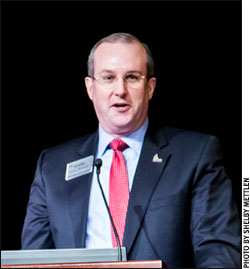New Opportunities, New Challenges
D.C. team outlines goals and expectations for new administration.
"It’s interesting to see a president who has done everything, or a lot of the things, that he said he was going to do,” Colin Woodall told his audience at the Cattle Industry Convention in Nashville, Tenn., Feb. 2.
With a laugh, the vice president of government affairs for the National Cattlemen's Beef Association (NCBA) continued, “There was a headline the other day that said Washington, D.C., was absolutely shocked that the president was doing what he said he was going to do.”
All jokes aside, Woodall said there is much to be optimistic about, but just as much to work on as the new president of the United States (POTUS) takes the stage. The D.C. team’s standout issues include regulatory repeal and reform, the 2018 Farm Bill, international trade, the Endangered Species Act, and border security and immigration.

Colin Woodall, vice president of government affairs for NCBA, said there is much to be optimistic about, but just as much to work on as the new POTUS takes the stage.
One of Trump’s standout promises is to eliminate excessive government regulation. With his “two-for-one” executive order, for every regulation signed into action, two must be eliminated. Woodall praised the action.
Federal lands
“With a new president and a new Congress, we have a lot of opportunities,” said Ethan Lane, executive director of the Public Lands Council (PLC). “After the past eight years, there’s need for us to provide regulatory relief to ranchers across the West.”
Lane called the Bureau of Land Management’s Planning 2.0 Congressional Act, “simply not correct,” and said it is being moved to the president’s desk. He hopes to get the act repealed.
Lane said the PLC continues to be involved in freeing up land for Western ranchers to graze their livestock. He also highlighted the importance of delisting a portion of the 1,000 species of animals on the Endangered Species list that have no post-recovery plan.
Taxes and farm policy
Director of Government Affairs Danielle Beck expressed optimism regarding Trump’s stance on tax reform. His campaign was built around it, and his administration promised a bill for tax reform within the first 100 days of his presidency. Beck called it ambitious, but says she remains hopeful that the estate tax and gift tax will be repealed.
Allison Cooke, executive director of governmental affairs for NCBA, outlined plans for the upcoming 2018 Farm Bill. The first hearing for the new bill convened Feb. 23 in Manhattan, Kan. Cooke said details will follow as 2018 approaches.
Trade
NCBA’s voice has been strong on the issue of the Trans-Pacific Partnership (TPP), and that’s a good thing, said Kent Bacus, director of international trade and market access for NCBA. “The good thing about cattlemen is we punch above our weight class,” he said.
“The truth is that exports create jobs,” he said, pointing out that the United States has seen a cumulative loss of about $400,000 per day in lost sales due to Trump’s decision to do away with TPP.
“If not TPP, what?” he asked. “If not now, when?” Bacus said NCBA will continue to educate the new administration on the importance of international trade to American cattlemen and the need for action on new trade agreements.
With talk of renegotiation regarding the North American Free Trade Agreement (NAFTA), bilateral, rather than multi-lateral, trade agreements have risen to the forefront of the new administration’s trade dynamic. Bacus said the United States must step in and secure bilateral agreements with top export markets, including Canada, Mexico and China, first and foremost.
Closing the show on a rather controversial note was mandatory country-of-origin labeling (COOL).
“COOL was the law of the land for six and a half years, and it did not work,” Woodall said. He maintained that the federal government is not the entity best suited to market beef, and that a mandatory, government-run program does not meet the needs of the cattle industry.
Audience opinions were mixed, but one message was consistent: The agricultural industry is optimistic about the new administration, and must realize the importance of education and being visible to Capitol Hill and its new players.

Editor’s Note: This article was written as part of Angus Media’s coverage of the 2017 Cattle Industry Convention. For further coverage, watch future issues of the Angus Journal and visit www.angus.media.






